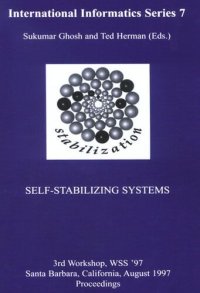
Ebook: Self-Stabilizing Systems
Author: Sukumar Ghosh, Ted Herman
- Series: International Informatics Series, 7
- Year: 1997
- Publisher: McGill-Queen's University Press
- Language: English
- pdf
Self- governing control is a defining characteristic of autonomous computing machinery. Autonomy implies some degree of independence, and when a system's ability to achieve its mission is independent of how it is initialized, the system is self-stabilizing. Application of self-stabilization to system and network components is motivated by core concerns of fault-tolerance in distributed systems. Self-stabilization is a solution to problems of transient memory faults and systems with dynamic reconfigurations. Research in self-stabilization explores many of the classic themes of distributed computing (distributed graph algorithms, mutual exclusion, distributed agreement). Recent papers combine self-stabilization with traditional forms of fault-tolerance, consider methodological issues for the design of self-stabilizing systems, investigate randomized techniques, and apply stabilization to new networking models. The workshop brings together concerns from theory and practice of self-stabilization.